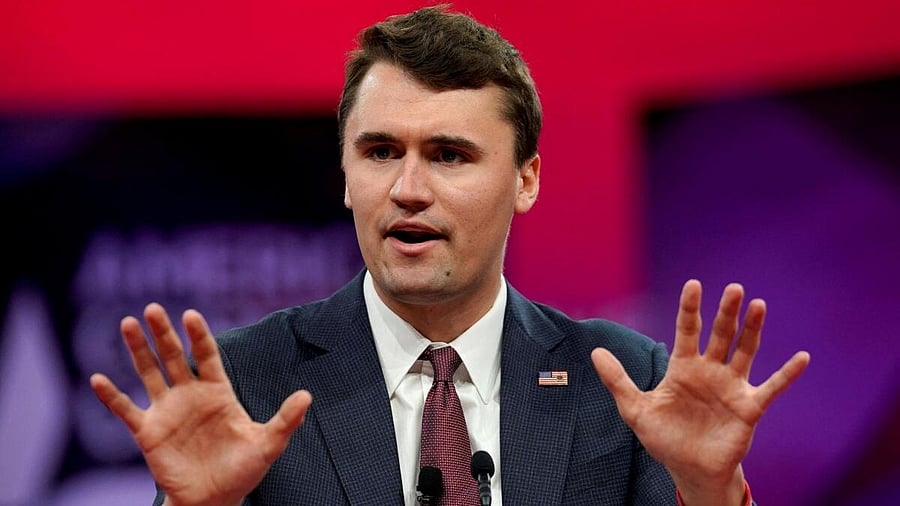
Charlie Kirk.
Credit: Reuters File Photo
The assassination of right-wing influencer Charlie Kirk marks a watershed moment in a surge of US political violence, one that some experts fear will inflame an already-fractured country and inspire more unrest.
”This event is horrifying, alarming, but not necessarily surprising,” said Mike Jensen, a researcher at the University of Maryland, which has tracked such violence in a terrorism database since 1970.
In the first six months of the year, the US experienced about 150 politically-motivated attacks — nearly twice as many as over the same period last year, said Jensen. “I think we are in a very, very dangerous spot right now that could quite easily escalate into more widespread civil unrest if we don't get a hold of it,” Jensen said. “This could absolutely serve as a kind of flashpoint that inspires more of it.”
Experts in domestic terrorism cite a convergence of factors for increased violence in the US: economic insecurity, anxiety over shifting racial and ethnic demographics, and the increasingly inflammatory tone of political discourse. Traditional ideological divides — once centered on policy disagreements — have morphed into a deeper, more personal animosity. That anger is amplified by a mix of social media, conspiracy theories and personal grievances.
Reuters identified last year at least of political violence across the US between the January 6, 2021, attack on the Capitol and the 2024 presidential election, marking the most significant and sustained surge in such violence since the 1970s.
“Extreme political violence is increasingly becoming the norm in our country, and the shooting of Charlie Kirk is indicative of a far greater and more pervasive issue: acts of violence are becoming more common, even without any clear ideology or motive,” said Jon Lewis, a research fellow at the Program on Extremism at George Washington University.
“There's really a concern about what the blowback to something like this will look like.”
Other experts who study political violence agreed. “People are reluctant to engage in violence first, but they're much more willing to engage in violence as retaliation,” said Lilliana Mason, a political science professor at Johns Hopkins University. “No one wants to be the one to start it, but lots of people want to be able to finish it.”
Kirk, a close ally of US President Donald Trump and founder of the conservative student group Turning Point USA, was addressing an outdoor crowd of about 3,000 at Utah Valley University when a gunshot rang out, sending him tumbling from his chair and attendees fleeing in panic.
Authorities had not yet publicly identified a suspect by Wednesday evening, nearly six hours after the shooting. FBI Director Kash Patel said an unnamed "subject" had been detained for questioning and then released.
Kirk, 31, was a pioneer in the conservative movement and harnessed the power of social media to lure millions of young Americans into Trump’s MAGA base.
“No one understood or had the Heart of the Youth in the United States better than Charlie,” Trump said in a social media post announcing Kirk’s death. Republican House of Representatives Speaker Mike Johnson told CNN there has been a “deluge” of lawmakers calling for stronger security in the wake of Kirk’s killing.
“Vicious spiral”
Trump himself was the subject of two assassination attempts last year. In one, the shooter was killed by authorities seconds after he fired. In the other, a man was arrested carrying a rifle and scope near a Palm Beach golf club where Trump was playing. His trial began this week.
In addition to those, two recent high-profile attacks by right-wing conspiracy theorists this year shook lawmakers and government workers across the country. In June, a Christian nationalist murdered a senior Democratic state lawmaker and her husband in Minnesota, and wounded a second Democrat. In August, a gunman obsessed with COVID-19 conspiracies sprayed gunfire at the Centers for Disease Control and Prevention headquarters in Atlanta, killing a police officer.
Since January, at least 21 people have been killed in political violence incidents, 14 of them in an attack in New Orleans by a jihadist claiming loyalty to the Islamic State group early on New Year’s Day.
In May, a pro-Palestinian activist murdered two Israeli embassy employees in Washington, and told police after his arrest, “I did it for Gaza,” according to court documents.
In July, a group of at least 11 militants in black military-style clothing attacked an immigration detention center in Texas, the Justice Department said. The group set off fireworks, spray-painted “traitor” and “ICE Pig” on vehicles, and shot a responding police officer in the neck, wounding him, while another sprayed gunfire at detention guards, the FBI said.
Since returning to office, Trump has scaled back efforts to counter domestic extremism, redirecting resources toward immigration enforcement and citing the southern border as the top security threat.
Jensen, the University of Maryland researcher who tracks violence for the National Consortium for the Study of Terrorism and Responses to Terrorism, said the future appears grim.
“This is an administration that, whether you agree with it or not, has made profound changes to this country in the eight months it’s been in office,” he said. “Some people love it, some people hate it. The people that hate it are starting to act out. People who love it are going to act out against those people that hate it, and it becomes a vicious spiral that could lead us into something really, really bad.”